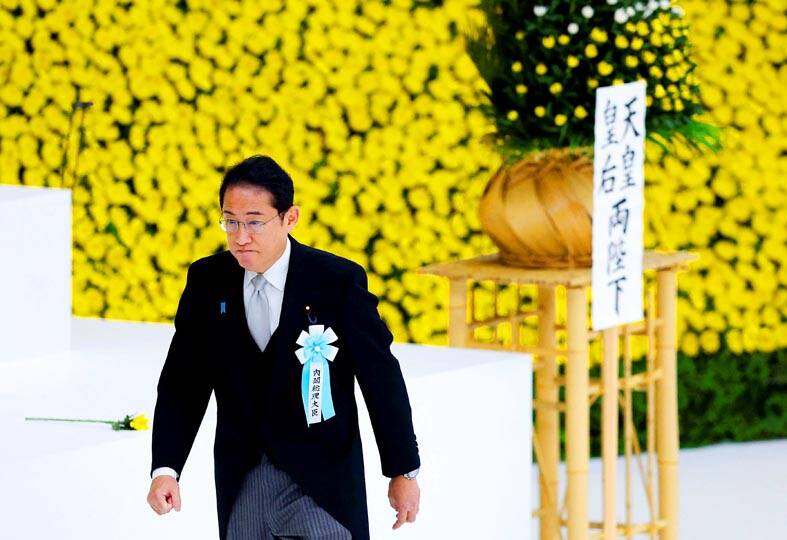The US, Japan and South Korea are to launch a series of joint initiatives on technology and defense when the nations’ leaders gather at Camp David on Friday, according to senior US administration officials, amid mounting shared concerns about China.
While the summit is unlikely to produce a formal security arrangement that commits the nations to each others’ defense, they would agree to mutual understanding about regional responsibilities and set up a three-way hotline to communicate in times of crisis, the officials said, speaking on condition of anonymity.
US President Joe Biden invited Japanese Prime Minister Fumio Kishida and South Korean President Yoon Suk-yeol to the storied presidential retreat in Maryland’s Catoctin Mountains as the Asian nations work to mend their tattered diplomatic relations in the face of greater regional threats posed by China’s rise and North Korea.

Photo: Reuters
It would mark the first in what US officials hope to be an annual gathering between the three nations’ leaders.
South Korea and Japan held their first joint summit in 12 years in March and have made steps to ease tensions after years of disputes, including some related to Japan’s 1910 to 1945 occupation of Korea.
Washington has formal collective defense arrangements in place with Tokyo and Seoul separately, but it wants the two nations to work closer together given growing concerns about China’s mounting power.
“We are anticipating some steps that will bring us closer together in the security realm,” said one of the US officials, adding that doing so would “add to our collective security.”
However, the official said that “it’s too much to ask — it’s a bridge too far — to fully expect a three-way security framework among each of us. However, we are taking steps whereby each of the countries understand responsibilities with respect to regional security, and we are advancing new areas of coordination and ballistic missile defense, again technology, that will be perceived as very substantial.”
The summit is also expected to lead to a joint statement between the nations that includes some language speaking to concerns about China’s desire to change the status of Taiwan.
The US, Japanese and South Korean joint statement is set to include language on maintaining peace and stability in the Taiwan Strait, one of the officials said.
The exact language on that and other provisions are expected to be negotiated up to the last minute, but the language currently under consideration would be consistent with prior US positions on the subject, avoiding a sharp escalation in rhetoric with Beijing as Washington has been seeking to ease tensions.

MAKING WAVES: China’s maritime militia could become a nontraditional threat in war, clogging up shipping lanes to prevent US or Japanese intervention, a report said About 1,900 Chinese ships flying flags of convenience and fishing vessels that participated in China’s military exercises around Taiwan last month and in January have been listed for monitoring, Coast Guard Administration (CGA) Deputy Director-General Hsieh Ching-chin (謝慶欽) said yesterday. Following amendments to the Commercial Port Act (商港法) and the Law of Ships (船舶法) last month, the CGA can designate possible berthing areas or deny ports of call for vessels suspected of loitering around areas where undersea cables can be accessed, Oceans Affairs Council Minister Kuan Bi-ling (管碧玲) said. The list of suspected ships, originally 300, had risen to about 1,900 as

Japan’s strategic alliance with the US would collapse if Tokyo were to turn away from a conflict in Taiwan, Japanese Prime Minister Sanae Takaichi said yesterday, but distanced herself from previous comments that suggested a possible military response in such an event. Takaichi expressed her latest views on a nationally broadcast TV program late on Monday, where an opposition party leader criticized her for igniting tensions with China with the earlier remarks. Ties between Japan and China have sunk to the worst level in years after Takaichi said in November that a hypothetical Chinese attack on Taiwan could bring about a Japanese

MORE RESPONSIBILITY: Draftees would be expected to fight alongside professional soldiers, likely requiring the transformation of some training brigades into combat units The armed forces are to start incorporating new conscripts into combined arms brigades this year to enhance combat readiness, the Executive Yuan’s latest policy report said. The new policy would affect Taiwanese men entering the military for their compulsory service, which was extended to one year under reforms by then-president Tsai Ing-wen (蔡英文) in 2022. The conscripts would be trained to operate machine guns, uncrewed aerial vehicles, anti-tank guided missile launchers and Stinger air defense systems, the report said, adding that the basic training would be lengthened to eight weeks. After basic training, conscripts would be sorted into infantry battalions that would take

DEEP-STRIKE CAPABILITY: The scenario simulated a PLA drill that turned into an assault on Taiwan’s critical infrastructure, with the launchers providing fire support Taiwan yesterday conducted this year’s first military exercises at Longsiang Base in Taichung, demonstrating the newly acquired High Mobility Artillery Rocket System’s (HIMARS) ability to provide fire support and deep-strike capabilities. The scenario simulated an attack on Penghu County, with HIMARS trucks immediately rolling into designated launch areas and firing barrages at the Wangan (望安) and Cimei (七美) islands, simulating the provision of fire support against invading forces. The HIMARS are supposed to “fire and leave,” which would significantly increase personnel and equipment survivability, a military official said. The drill simulated an exercise launched by the Chinese People’s Liberation Army (PLA) Eastern